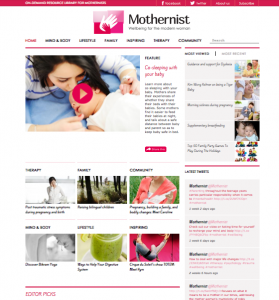Life in a modern city can be hectic and stressful. Especially if you’re a working mother trying to balance multiple roles – career/business, caregiver, mother, wife, and friend.
The tremendous strain of continually juggling numerous balls may also result in the deterioration of one’s mental, spiritual and emotional health.
In modern cities like Singapore, women often need to fulfill domestic roles over and above bringing in their fair share of the bacon. Social stigmas relating to mental health also prevail in our culture, despite advances in psychological therapies.
Enter Mothernist.com. Launched in September last year, the the website is the brainchild of Dr Julie Goldstein. Providing psychology-driven media content, Mothernist.com (“Mothernist”) explores issues that concern Asian women, notably mothers, and offers easily digestible videos that educate and encourage. They cover topics such as health, family, lifestyle, and community to inspiration.
Beyond information, Mothernist provides users with the option of seeking web-based therapy and counselling in anonymity. Such non-intrusive methods offers customers quality advice and therapy in the privacy and security of their own homes.
To find out more about mental health issues for women, I interviewed the founder of Mothernist Dr Julie Goldstein, a 15 year veteran in the field of psychology and therapy. Here are the excerpts from our interview.

Dr Julie Goldstein (from Mothernist.com)
1) What are the challenges faced by contemporary Asian mothers?
It can be hard-going being a modern woman and/or mother. The modern woman typically takes on multiple roles either because society demands it or because this is how a woman’s role has evolved through the years.
In common with other cultures, the Asian modern mother’s multiplicity of roles comprises a unique combination of elements such as environment, culture and life experiences. The very essence of this multiplicity is both beautiful and complex, and it is often the complex nature that can lead a mother to feel disjointed.
An Asian mother will typically transmit culture to her children and feel responsible for it. The modern Asian mother starts out with the values of Asian culture, such as filial piety, shame (as a method of reinforcing expectations and proper behaviour) and self-control (being modest and humble) and could find herself having to find a middle ground.
More can be done to raise awareness about mental health and well-being, particularly here in Asia where seeking help through treatment or counseling carries social and cultural stigmas such as bringing shame to the family and of putting a mother’s needs first when she is the principle caregiver. A modern woman may further feel there are obstacles to seeking psychological help such as preconceived ideas of anticipated utility and risk, treatment fears, and also time and cost issues.
2) Having lived in Singapore for a period of time, what do you see as possible issues in the mental health of our people?
In Singapore, there is a general yearning for more recognition of the issues. For example, there was the release of Eric Khoo’s film, “Recipe”, in September. The movie tells the story of a daughter who takes care of her mother who suffers from dementia, and shows in a very meaningful and informative way the challenges faced by caregivers.
Also in 2013, Health Minister Dr Amy Khor pointed out that more could be done to increase awareness of mental health needs by reinforcing alliances between health and social services.
Women are extremely hard workers in Singapore, and this can result in enormous issues of shame. Many women – and mothers – feel ashamed for not being good enough in parts of their lives outside of work. This is particularly the case if they work long hours and do not know where to put boundaries. It’s hard to have a fulfilled life if the work ethic is exceedingly competitive and ‘pushy’.
Moreover, depression and anxiety are on the rise in Singapore with 6% suffering from depression and 3.5% suffering from anxiety (Singapore Mental Health Survey 2004). What’s more, according to the World Health Organisation, one out of 10 people who suffers from a mental health issue never seeks treatment out of shame or lack of knowledge about the issue.
This information says to me that a psychology for the people is required and that Singaporeans do care about their mental health. But how to gain access to help is a key question.
3) Do you foresee mental health issues becoming a major challenge in today’s hectic multi-tasking society? If so, why?
Our modern way of living is fast-paced and unrelenting. We also have shorter attention spans and are better ‘compartmentalizers’ than we’ve ever been. We deal better with bite-sized chunks than a story with continuity and we rarely sit down to think about how our lives are unfolding. This is particularly true of women with multiple roles, who manage to switch from one to the next and become quite good at shutting out different parts of themselves. This is a risk because it creates mind-body splits and our emotions can suffer a knock-out effect.
We also have lost the ability to breathe and relax, which is why mindfulness activities and exercise programmes are so popular. By the same token, we have to accept that many of us are adapting, particularly to a more ‘online’ way of living. On the upside, there is a solution for multi-tasking/ always-online individuals – online therapy. These are tools that can help people who lead hectic multi-tasking lives.
Mothernist focuses on online psychology tools. It has short online video clips that appeal to senses other than the written word. Users can also access an online therapy platform called talktala.com from our site.
4) How should we overcome these challenges?
By moving with our times, and accepting our constant evolution as human beings; and raising our awareness of psychological issues and reaching out for help when we need it. Funnily enough, this is not always easy. With Mothernist, the process is a great deal easier.
5) How has technology, particularly smartphones and social media, affected the psychological health of today’s families?
Technology, smartphones and social media have an instant gratification element to them. They seem to make us want an instant response through messaging. As a result, our attention spans have changed dramatically; they’ve shortened and become more “efficient”. We’ve very much become an extension of these devices – rather than the other way around – and many people feel lost without them.
Families are a reflection of the individual; as the individual feels more disjointed, so do families. Family members speak less to one another, which heightens the risk of isolation and a total breakdown in real-time communication.
That’s not to say that virtual communication cannot be useful; it just does not and cannot replace family support. There needs to be a balanced approach or methods that we can employ to counterbalance our tendencies to want to be online all the time. I really think that it’s important to have limits on the times that technology is used in the household, and to build a sanctuary of “other” time. It is parents’ responsibility to educate themselves and their children to use online tools in a healthy way.
6) What do you hope to achieve with Mothernist.com? What difference do you wish to make?
Mothernist aims to raise the awareness of the complexity and multiplicity of roles of the modern woman and mother via a psychology and video platform for issues discussion and experience sharing that can help modern women to maximise their potential.
Mothernist also seeks to facilitate and nourish women’s different personalities; not all women in their multi-tasking roles will be interested in the same roles or combine the elements in the same way. The elements include work, family, spouse, children, friends, leisure, health/fitness, grocery shopping, etc. Environment, culture and life experiences are also overarching influences.
Each one of us – men and women – is like a jigsaw puzzle. The range of information on our site can help to put together the pieces of that jigsaw in a non-invasive and fulfilling way. Last, Mothernist wishes to make a difference in the field of mental health and psychology by increasing awareness of online support options.
7) How do you hope to grow and expand the business?
We are in contact with Asian Women’s Welfare Association (http://www.awwa.org.sg/) and are discussing ways in which social workers and mental health professionals could make use of the content on Mothernist.com, which they have found to be very informative. We are also in talks with psychologists and cousellors who’d like to contribute to our site and ultimately play a role in providing online services.
We will be launching other sites that cater to specific audiences and discussion topics. It could be one site that deals specifically with relationships, and another that focuses on adolescent/young adult issues (for 15 to 20 year-olds).
8) Finally, any parting words of advice?
To entrepreneurs and business women and men I’d like to say, be aware of the need to take care of yourself – a day is only as busy as you make it. I would also encourage women and men to visit Mothernist.com; I’m sure they’d find the information interesting and useful.
I would also like to touch on the cultural tension that exists between the old and the new (old traditions, new values) and say that if you are feeling blue there is a good reason for it (please read “Steps to Wellness” on the site). Reach out online – it won’t take too much time – and stay healthy.


Hi,
Can I repost this on my blog?
I love this read, it is really a new way of thinking about the mothers of modern times. I hop
e people love to read this and understand your point of view.
I wanted to leave a little comment to support you and wish you a good continuation. Wishing you the best of luck for all your blogging efforts.
I like this website so much it’s really awesome.I have also gone through your other posts too and they are also very much appreciate able and I’m just waiting for your next update to come as I like all your posts.
Thanks for sharing a nice article really such a wonderful site you have done a great job once more thanks a lot
This is an excellent post I saw thanks for sharing it. It is really what I wanted to see hope in future you will continue for sharing such an excellent post.
Very Nice article dear, I love the way you explain the things, It is very easy to understand. Keep up the good work buddy.
Nice Article
Great Sharing
Happy Merry Christmas To All My Dear Friends
Great Sharing
Nice Article